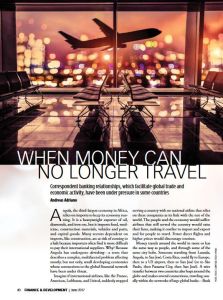Join getAbstract to access the summary!

Join getAbstract to access the summary!
Andreas Adriano
When Money Can No Longer Travel
IMF, 2017
What's inside?
“Derisking” might be a sound banking strategy, but it could financially isolate some countries.
Recommendation
The ability of companies in some developing countries to conduct international business is at risk due to – paradoxically – “derisking.” Under derisking, global banks stop wiring money, exchanging currency or processing credit card payments for nations perceived as money-laundering or terrorist-financing risks. But, as Andreas Adriano of the International Monetary Fund explains, without these various forms of correspondent banking, businesses and citizens in emerging markets are choked off from the global financial system. getAbstract recommends this intriguing article to bankers and those traveling to or conducting business in a developing nation.
Summary
About the Author
Andreas Adriano is a senior communications officer at the IMF.



















Comment on this summary